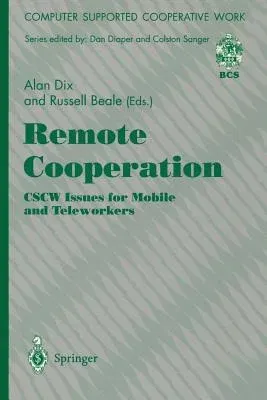Alan J Dix
(Author)Remote Cooperation: Cscw Issues for Mobile and Teleworkers (Edition.)Paperback - Edition., 18 October 1996

Qty
1
Turbo
Ships in 2 - 3 days
In Stock
Free Delivery
Cash on Delivery
15 Days
Free Returns
Secure Checkout
Part of Series
Computer Supported Cooperative Work
Part of Series
CSCW: Computer Supported Cooperative Work
Part of Series
Astronomy and Astrophysics Library,
Part of Series
Computer Suppported Cooperative Work
Print Length
236 pages
Language
English
Publisher
Springer
Date Published
18 Oct 1996
ISBN-10
3540760350
ISBN-13
9783540760351
Description
Product Details
Authors:
Book Edition:
Edition.
Book Format:
Paperback
Country of Origin:
US
Date Published:
18 October 1996
Dimensions:
23.39 x
15.6 x
1.37 cm
ISBN-10:
3540760350
ISBN-13:
9783540760351
Language:
English
Location:
London
Pages:
236
Publisher:
Series:
Weight:
362.87 gm

